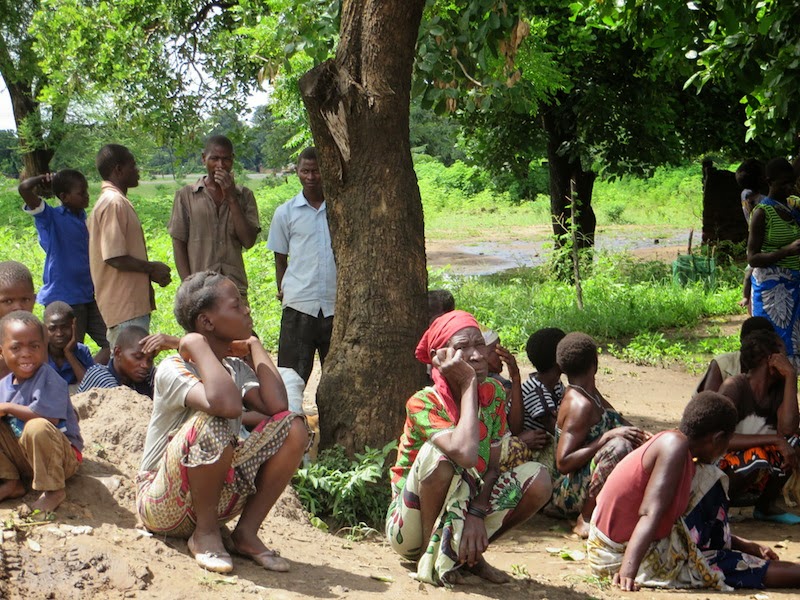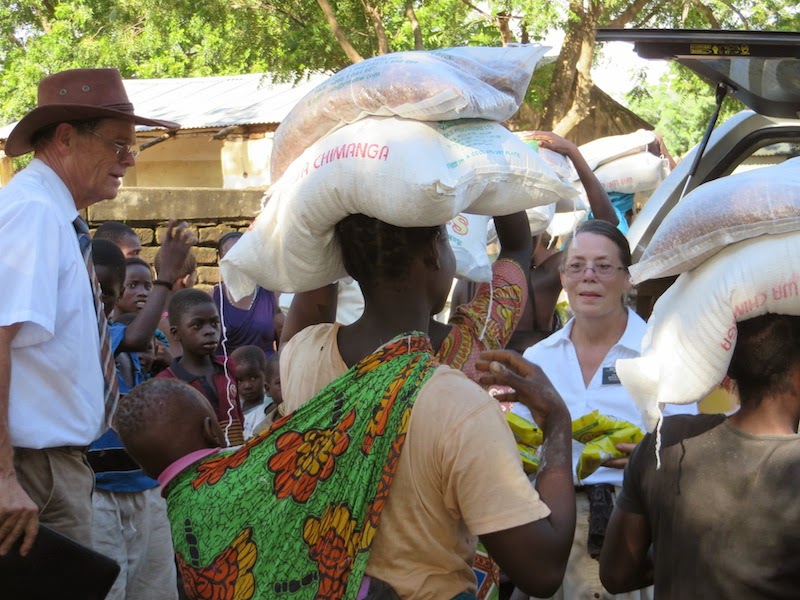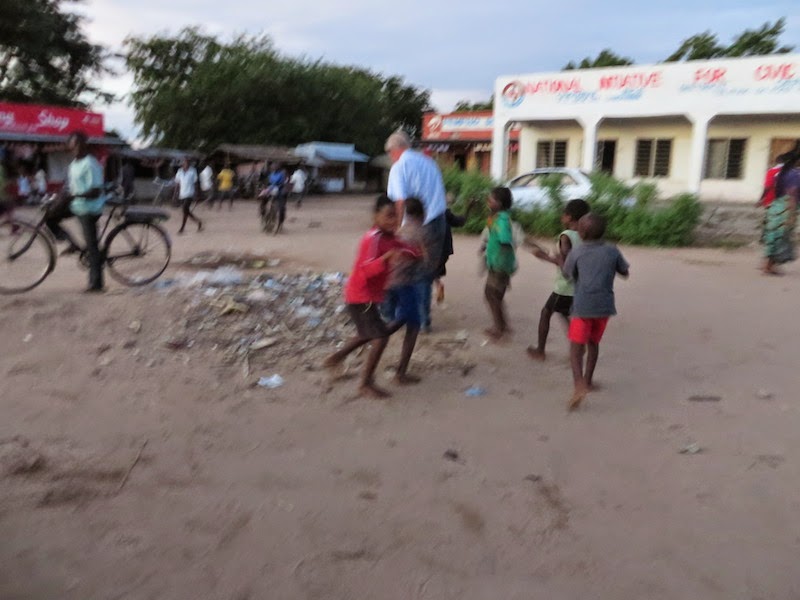For one day last week, we were able to walk in their shoes, so to speak, on the day of the distribution. That was the culmination of all of their hard work so we just got to participate in the best part. Still, we got a taste of the frustrations they have had to deal with and we came away with a slightly more informed understanding of how difficult it is to give aid to the people who need it so desperately. I say the obvious: this is not new in Africa.
We arose at 5:00 AM so we could pick up three members of the Zingwangwa branch who had volunteered to go with us to help. When we headed south, it was a misty day and we eventually got a view of some of the flooding.
We saw the usual delays and breakdowns on the major road we traveled, such as this strangely configured truck blocking the road.
I couldn't figure out why Chikwawa was spelled differently on the government building but no where else.
We met up with Elder Bodily and Elder Reynolds who had driven two other trucks, bringing additional volunteers from the other Blantyre branches.
Doesn't this look like we had a map? Not.
There were no maps to the villages or distribution sites. Instead, we had a government official from the Department of DISASTER Management Affairs who was going to show us where to go.
We reviewed the amount of goods and numbers of people in each spot. Elder Bodily had organized it as best he could with the information he had. It made the most sense to divide up so that George and I in our truck, along with one flatbed truck of goods, would follow the lead car of Aaron, who was the liaison between the Church and the government, and the government official, who knew the way.
The other trucks would go to deliver at one major camp at the other side of the district.
Originally, the plan was to distribute blankets along with a month's supply of food, but the project had taken so long to get approval, that the government said they now had enough blankets (even though the cold season is still to come). We had the number count of how much was to be distributed at each camp. A local leader would be there and have a list of recipients, people who had registered with the government. This was in hopes of eliminating some of the possible complications such as people taking and reselling the goods or local villagers acting as the displaced victims in nearby camps.
So, what did we distribute to the people on the list?
1 10 K bag of maize meal
1 6 K bag of cowpeas (a type of legume that can cook quickly so as to save on fuel)
4 smaller bags of a dried soy relish to give flavor and protein
To the village chief or official, we also gave oil and salt to be distributed among the households or for communal cooking.
I should explain that nsima, a dish made from white maize flour and water, is a staple of the Malawian diet. It's like a very thick porridge and is almost always eaten with two side dishes: a protein such as a meat or beans, and a vegetable such as pumpkin leaves or rape leaves or cabbage. They usually eat it with a relish of peppers. Nsima can be eaten for breakfast, lunch, and dinner.
The first stop was slightly off the main road and we could see the camp of in the distance. We had planned on delivering 90 portions at his camp. All of this was dictated by previously received government statistics.
Because this was our first stop, we determined the best way for the distribution. Aaron is in the suit and the government official is the woman.
The villagers waited
and then helped us move the goods from the truck to our meeting spot.
Alexander read each name from the list that was provided and they stepped forward to receive the food. It all went well except we had one woman at the end of the line who said she hadn't received her allotment.
Time for a recount! We read off names again and double-checked and she received her portion. We only ended up with 50 names, so that left us with extra goods.
Our second stop was supposed to be a camp with a distribution of 360 - the most by far of any of the scheduled stops. Following the government official, we drove off the highway with the flatbed truck proceeding behind.
We drove through some collections of home, stopping once to ask a boy on a bike how far it was to the camp. He didn't know of any camp. The driver of the truck was concerned about not being able to turn around to come back, so he remained behind while we went on to check it out. Once again, we stopped to ask and the neighbors indicated that there was no camp further on nor had there ever been one. We turned around to go back to the main road. There was no explanation on the part of the government official. Had there been a mix-up somehow? We will never know because there was no attempt to solve the problem. That left us with so many more bags of staples and the intent had been to distribute all of them in the one day. Our great fear was that the food would not get distributed, would end up in a government warehouse somewhere, with the district council overseeing its "distribution".
Next scheduled stop... we just pulled to the side of the road.
We couldn't see the village but we had the twenty names and everything was very orderly.
Nearby villagers watched.
I also handed out some baby shirts that Sister Bodily had given me.
When we got to the next town, we had to wait since the displaced villagers had gathered at a nearby school and we needed to send for them. This time, we were in the midst of a town so there were additional people who wanted to know what was going on and to see how they could be recipients.
I walked alone up the road because the traffic ahead appeared to be at a standstill, perhaps due to the four hour deluge of the night before.



Yes, that is our left-side mirror, held on by duct tape. (The part was ordered three months ago.)
We weren't the only ones trying to get across.
Gives you an idea of how deep it was in certain areas.
Eventually, we drove off the main road, ending up in the middle of extensive sugar cane fields. We were in the Illovo
Sugar Estate, one of the more impressive operations we have seen in Malawi. After a few miles, we drove into a village, checked out the road for the big truck, and reconnected with the other half of our group.
Some of these flood victims were living in tents and some in vacant homes. When they were all assembled, there was some sort of rally, complete with many shrill calls, with the tongue vibrating back and forth.
So we had both large trucks, the list of 120 names, and we began the distribution.
It is much hotter in Chikwawa than in Blantyre.
I loved the groups of children that collected around us. Without toys or TV, children have fun anywhere.
We were the spectacle and the entertainment.
Elder Reynolds made it official by leading them in "Head, Shoulders, Knees and Toes" and "Little Bunny Foo Foo" and every other song he could think of. Look at that crowd!
Elder Bodily tried to move the children back so their mothers could come collect food. He roared at them, and they delightfully answered in kind!
We finally finished the distribution but we had so much food still on the truck.
There were so many more people, and even though they were not displaced, they, too, were victims of the flood in other ways. Their fields has been destroyed and they were now sharing their village with so many more people.
It took awhile, but the leaders managed to get another list of 120 local people, and the distribution began anew.
Sometimes the large weave bags of maize would leak, and a white dusting would sift down upon faces and babies in the slings.
Sister Bodily had been very concerned that women should receive most of the food, because they would take care of it and use it to feed their families. Probably 85% of the recipients were women, many of them carrying babies (sometimes even nursing babies) while they balanced the bags on their heads.
Our crew of three members, along with the truck drivers, had skipped lunch and had very little to drink. We were exhausted by the end of the day.
However, the frustration was that we had one third of our goods still on a truck. Even knowing that there were very needy people close by, we could not simply give it away without a system in place. It would have caused chaos and fighting.
That meant it was going back to the government warehouse, something that we very much did not want to happen. We didn't see it, but the Bodilys oversaw the unloading into the "secure" warehouse that night, close to government headquarters - both the extra food and the blankets.
The following day Elder Bodily called several times to arrange for additional deliveries that they could oversee, but could not get anyone to return his calls.
George and I headed back, extremely tired, somewhat frustrated, and with three hungry young men in the back seat.
Alexander Tsegula, Maxwell Mbera (who leaves on a mission to Mozambique in three weeks) and Kondwani Mkochi, a returned missionary who served in Zimbabwe.
On the way, we stopped in a small town so they could get "take-away" - not exactly fast food as we know it since it took 45 minutes to cook the chicken and chips to take away!
While George and I waited in the car, George saw and joined the one thing that revived his spirits..
While George and I waited in the car, George saw and joined the one thing that revived his spirits..





















































No comments:
Post a Comment